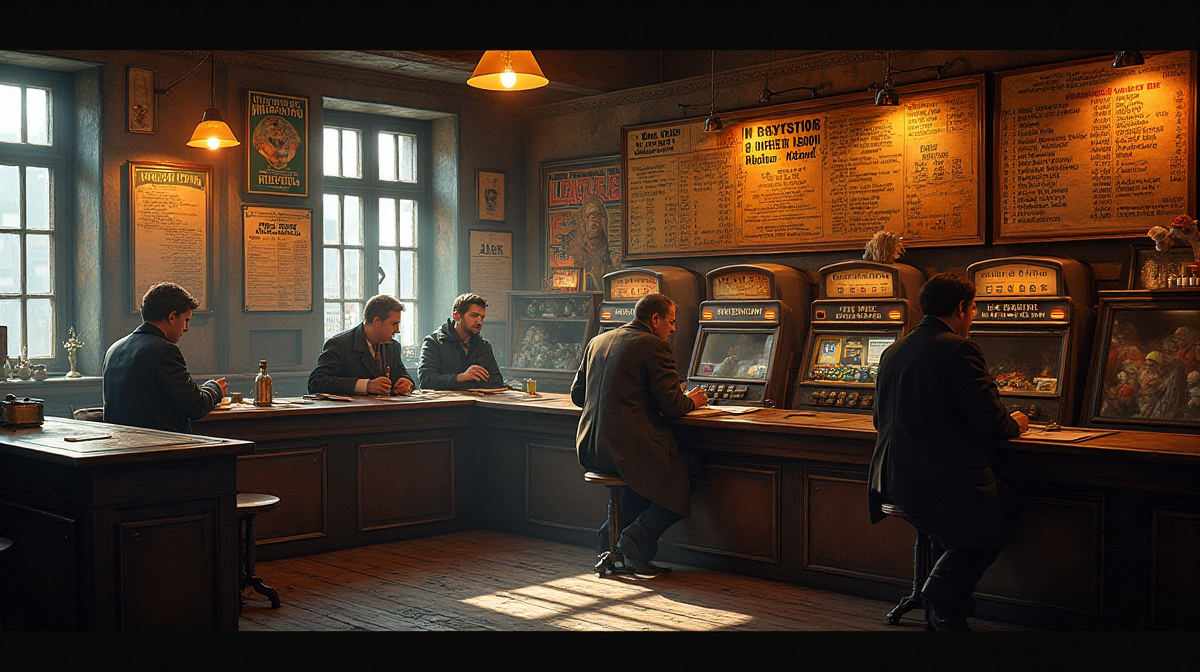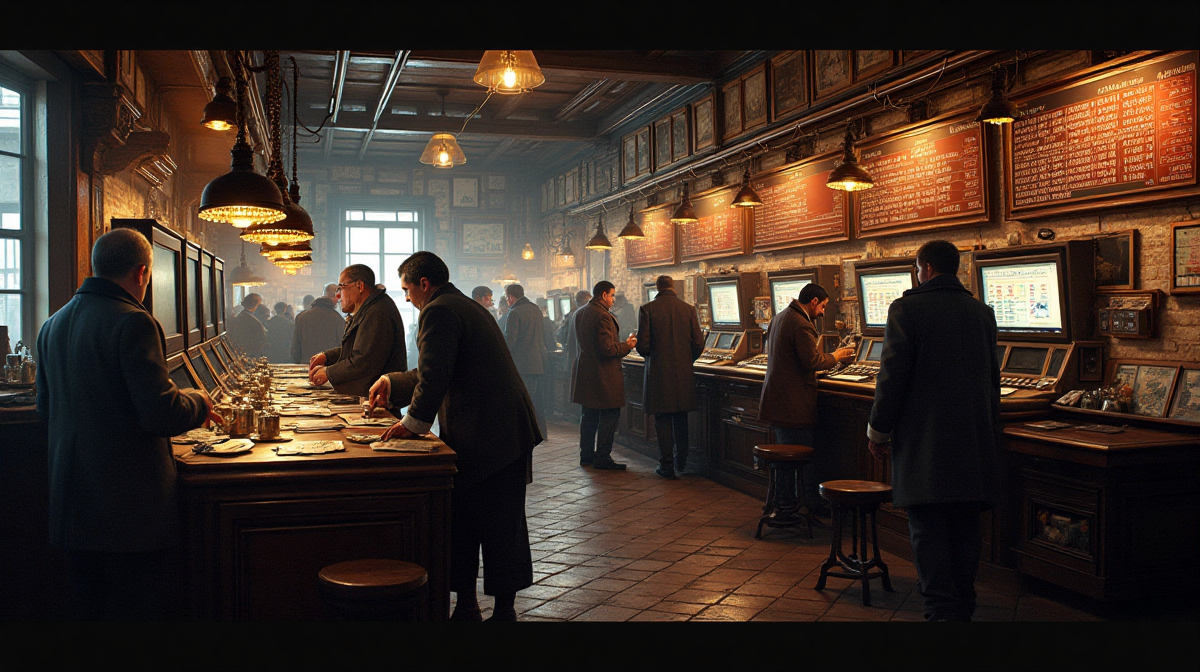Old Betshop Secrets: Still Worth It?
The Allure of 'Old Betshop' & the Nostalgia Factor
For many seasoned punters, the memory of visiting a traditional betshop evokes a strong sense of nostalgia. The smoky atmosphere, the hushed anticipation, the rapid scribbling on betting slips – it was a different world. Today, the convenience of online betting dominates, but whispers of old betshop secrets continue to circulate, promising an edge in a seemingly sophisticated market. But do these techniques still hold value, or are they relics of a bygone era?
Defining 'Old Betshop Secrets': What Are We Talking About?
“Old betshop secrets” refer to the strategies employed by successful bettors before the widespread availability of the internet and advanced betting tools. These were born from keen observation, meticulous calculation, and a deep understanding of bookmaker behavior. They weren’t about predicting the future, but about exploiting inefficiencies in the market—or, more accurately, exploiting what those physical bookmakers offered. This often went hand-in-hand with keeping a close eye on the english premier league table to identify potential value.
Why Revisit These Strategies in the Modern Betting Landscape? (Initial User Interest - Is it still relevant?)
In a world of algorithms and instant data, it’s easy to dismiss these traditional methods. However, the core principles of value betting, arbitrage, and understanding market biases remain timeless. The digital age hasn't eliminated these opportunities; it's merely transformed how we access and exploit them. Even with the rise of betshop 9ja mobile bet9ja and other online platforms, the foundational thinking behind those original strategies is still vital.
Historical Context: The Golden Age of Betshops
A Brief History of UK Betting Shops – Before Online Dominance
Betting shops as we know them began to emerge in the UK after the Betting and Gaming Act of 1961. Prior to this, betting was largely confined to racetraces. These early shops were locally focused, often run by individuals with a strong knowledge of specific sports. They lacked the sophisticated technology and nationwide pricing we see today, creating a fragmented market ripe for exploitation.
The Tactics Employed By Successful Old School Bettors
Successful bettors in this era focused on identifying discrepancies in odds offered by different shops, capitalizing on promotions and understanding the nuances of value. They honed their abilities by physically visiting multiple bookmakers, meticulously comparing prices, and building relationships with shop staff. This was a labor-intensive process, crucially focused on knowing your margins and looking for favorable odds on premier league scores.
Key Differences: Then vs. Now – Bookmaker Strategies & Betting Opportunities
Today’s bookmakers utilize complex algorithms and real-time data feeds to set their prices, driven by global markets. The speed of transaction is vastly increased via platforms like betshop 9ja mobile bet9ja, and the range of betting options is exponentially larger. However, inefficiencies still exist, albeit often fleeting. The old system involved manual processes; the new one is automated, but automation isn't perfect.

Core 'Old Betshop Secrets' – Strategies Explained
The Power of Arbitrage (Arbing) in Physical Shops
Arbing, or sure betting, involves exploiting price differences between bookmakers to guarantee a profit, regardless of the outcome. In the old days, this required physically visiting several shops and placing bets simultaneously.
Identifying Price Discrepancies Between Betshops
Successful arbers dedicated considerable time to scouting the landscape and noting which shops were slower to react to changing information.
The Challenges & Risks of Physical Arbing
The biggest challenge was logistical – time constraints, travel costs, and the possibility of odds changing before all bets could be placed. It also drew attention from bookmakers, who often limited stakes or even refused bets from known arbers.
Utilizing 'Dutching' – Maximizing Returns Across Multiple Outcomes
Dutching involves calculating stakes for different outcomes of an event to ensure the same profit, regardless of which selection wins.
Finding Suitable Dutching Opportunities
Dutching was frequently used in races with many runners, or in markets where multiple outcomes were plausible.
Calculating Stake Sizes for Optimal Returns
Dutching requires precise calculations—something early bettors accomplished with pen and paper, which helps to understand how modern tools automate this process.
Exploiting Bookmaker Promotions & Free Bets (Then & Now)
Classic Betshop Promotions (e.g., Money Back Specials)
Bookmakers traditionally used promotions like ‘money back if your horse falls’ or ‘best odds guaranteed’ to attract customers. Savvy bettors would strategically utilize these offers to minimize risk and increase potential returns.
How to Integrate Online & Offline Promotions Today
Today, these types of promotions are commonplace online as well. The key is to consistently track offers and combine them with value bets or arbitrage opportunities.
The Importance of 'Value' Betting & Identifying Soft Books
How to Spot Books with Less Sophisticated Pricing
Value betting involves identifying bets where the odds offered by the bookmaker exceed the true probability of the event occurring. “Soft books” were those with less sophisticated pricing models, often offering more generous odds due to a lack of in-depth analysis.
Understanding Margin & Overrounds
Understanding the bookmaker's margin (or overround) – the profit they build into the odds – is crucial for identifying value.
In-Shop Observation & Reading the 'Room' - Identifying Bias
Observing Betting Patterns & Public Sentiment
Experienced bettors would physically observe betting patterns in shops to gauge public sentiment and identify potential biases.
Capitalizing on Public Misconceptions
If a particular team or outcome was heavily backed by the public, a shrewd bettor might look for value on the opposing side, believing the odds were inflated due to the one-sided betting.
Are These Secrets Still Viable Today? – Adapting to the Digital Age
The Impact of Online Betting & Price Comparison Sites
Online betting and price comparison sites have largely eliminated the logistical challenges of physical arbing. However, opportunities still exist, particularly in niche markets or with less-followed sports.
Arbing & Dutching in the Age of Exchange Betting
Betting exchanges like Betfair offer even greater opportunities for arbing and Dutching, with tighter spreads and more liquidity.
Finding Value in a Highly Competitive Market
Finding genuine value in today’s highly competitive market requires more sophisticated analysis and a deeper understanding of statistical models.
The Role of Automated Tools & Software (Compared to Manual Methods)
Automated tools and software can scan multiple bookmakers and exchanges in real time, identifying arbitrage opportunities and value bets. This eliminates the need for manual calculations and constant monitoring.
The Decline of Physical Betshops: Reduced Opportunities?
The decline of physical betshop locations has undoubtedly reduced some opportunities for in-shop observation and exploiting local biases.
Risks & Considerations – Staying Compliant & Responsible
Bookmaker Scrutiny & Account Restrictions
Bookmakers actively monitor betting activity and may restrict or close accounts suspected of professional betting or arbitrage.
The Legal Aspects of Arbitrage & Value Betting
Arbitrage and value betting are not illegal, but bookmakers reserve the right to refuse bets from individuals they deem to be detrimental to their business.
Managing Bankroll & Minimizing Risk
Proper bankroll management is essential for mitigating risk and ensuring long-term profitability.
Responsible Gambling: A Crucial Reminder
It’s crucial to gamble responsibly and within your means. Never bet more than you can afford to lose.

Modern Adaptations & Hybrid Strategies
Combining 'Old School' Principles with Modern Data Analysis
The most successful bettors today combine traditional principles with modern data analysis techniques. They use statistical models, machine learning, and data visualization to identify value and make informed betting decisions.
Utilizing Online Tools to Replicate In-Shop Observation
Online forums, social media, and betting communities can provide valuable insights into public sentiment and potential biases.
Finding Untapped ‘Value’ Markets
Niche sports, less-followed leagues, and specific betting markets often offer greater value than mainstream options.
The Rise of Asian Handicaps and their connection to Dutching
Asian handicaps provide another layer of sophistication to betting, and the principles of Dutching can be effectively applied to these markets.
Conclusion: Do Old Betshop Secrets Still Hold Water?
The Evolution of Betting – A Continuous Learning Process
The world of betting is constantly evolving. The strategies that worked yesterday may not work tomorrow. Continuous learning and adaptation are essential for long-term success.
Final Thoughts: Is the Nostalgia Justified?
While the romance of the old betshop may be nostalgic, the underlying principles of successful betting remain relevant. The tools may have changed, but the mindset—one of discipline, analysis, and a relentless pursuit of value—is still paramount. The impact on markets like following the english premier league table and understanding premier league scores hasn't diminished, only shifted in how we analyze that data and place our bets.

